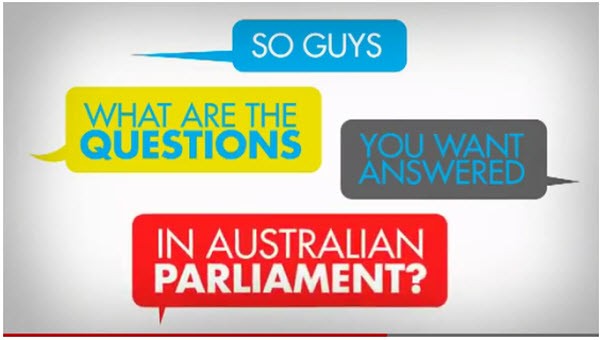Question time resumes on February 7, with the only excitement deriving from how new Speaker Peter Slipper will perform in the House of Representatives. Otherwise it will be the same as last year, and the year before, and so on: the primary mechanism of parliamentary accountability reduced to theatre — not much above the pantomime kind — where the audience isn’t voters but your opponents, the press gallery above and evening news producers. The only actual scrutiny comes from the cross-benches down the end.
And like theatre, there’s little opportunity for audience interaction. Voters — or at least politically engaged voters — can watch but not participate. Some MPs reach beyond the bubble during proceedings via social media, usually to reinforce the lines their side is saying in the performance on stage, like a chorus. But otherwise voters just get to watch the sorry spectacle and complain among themselves how childish it is.
Today OurSay and Crikey are joining forces to launch an attempt not so much to change that, because real reform of question time rests with the major parties, but to make a minor breach in the barrier between MPs and voters by giving voters an opportunity to propose a question, and vote for other questions, to be asked by an MP in question time. Crowdsourcing will come to federal parliament via one MP — we’re keeping their identity confidential for the moment — who is prepared to give voters a chance to identify issues important to them.
Federal politics is a decidedly un-interactive business. The applies to parliament itself and to politics more broadly. The public have to surrender their phones before they enter the gallery — indeed, it’s only been for the past couple of years that the press gallery could take laptops and smartphones into the chamber. Rare are the politicians who use social media as a genuinely interactive tool rather than as another medium for press releases. The only way for voters to influence parliamentary proceedings is via the laborious 19th century mechanism of petitions.
OurSay will briefly drag parliament into the early 21st century by giving voters a chance to have their say on using question time as a means of accountability rather than performance. Every Wednesday, we’ll feature a new question (and maybe who’s trying to influence voting) through until voting closes in the first week of March.
Start hitting OurSay with questions here: @OurSayAust, @OurSayPeoplesQ #PeoplesQ #auspol or on Facebook.









Question time is not the ‘primary mechanism for parliamentary accountability’.
Ordering the production of documents, or questions on notice will always produce more information that QT does.
It is actually worse than this, because petitions are not just laborious and 19C, they are now used by all parties, and interest groups, as a way of harvesting names and email addresses for their databases. As a result, I won’t sign one any longer. A lot of people won’t, which means we are worse off than we would have been in the 19C.
Piffle. Sure, your question will get asked – but don’t expect an answer. In that respect Question Time lives up to its name… We might actually get somewhere if it was called Answer Time.
It’s an interesting concept. I guess my first comment is that parliament is not meant to be interactive in the sense Bernard suggests. We elected these people to represent our views and therefore know what questions we want asked. The interactive part happens (or is supposed to happen) with individual MPs and their constituents.
Unfortunately, there is no scope for an MP who is part of a party to ask the Crikey question. This is because all the parties (including the Greens) orchestrate the questions that will be asked as part of parliamentary tactics each day.
So it seems Crikey has secured the agreement of an independent MP to ask the question. Consideringf that indies are allocated only a small number of questions, compared to the parties, I wonder what the indie’s actual constituents will think about their MP asking a crowd-sourced question instead of one pertaining to their electorate?
Every little bit helps and if it doesn’t kill us it might make us stronger.